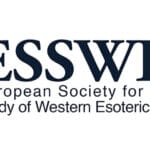
Home » Research » Current research projects » Research: Hedvig Martin
This four-year project is funded by the Axel and Margaret Ax:son Johnson Foundation for Public Benefit.
The Swedish painter Hilma af Klint (1862 – 1944) has stirred great public interest with the abstract series Paintings for the Temple (1906 – 1915), today exhibited all over the western world and recognised as having extraordinary artistic and historical value. Af Klint believed her paintings to be created in contact with higher spirits who, in her experience, controlled her hand to transfer higher spiritual knowledge into her art. However eccentric af Klint’s method and beliefs might seem today, she was part of a much broader interest in the spiritual and the occult during the fin-de-siecle, which is today acknowledged as one of the major inspirations for the literary and artistic intelligentsia. In fact, af Klint left behind over 26 000 pages of occult notebooks covering her religious and artistic aspirations, which are key to understanding her biography but are still shrouded in obscurity due to limited research. Occultism was a central component in the development of abstract art and af Klint is today praised as a pioneer of abstraction, since she produced her first abstract paintings five years before Wassily Kandinsky allegedly ‘invented’ this new art form. However, the claim to af Klint’s status and the consequent shift in the canon of art history has generated a debate among scholars. While some assert that af Klint was an abstract pioneer, others claim the opposite since af Klint’s paintings do not meet the requirements of the classical formalist definition – that abstraction exists only when it is aesthetically independent of and without correspondence to any real or imaginary object, and is preferably complemented by theoretical reflections upon this formal choice.
This research project takes an interdisciplinary approach to the case of af Klint and will explore her religious-historical legacy, while also critically assessing her position in art history. Through the first in-depth study of af Klint’s notebooks and private esoteric library, covering the period 1896 – 1915, this project will offer new knowledge about af Klint’s religious worldview and artistic methods up until the completion of Paintings for the Temple. Furthermore, it will also give attention to the psychological effects of agency, productivity, and flow that can be observed when working in states of trance or spirit possession. Finally, the project will address the problem of abstract art through analysing textual and visual sources from abstract pioneers as well as mediumistic painters, to challenge the formalist definition and explore the conditions on which we can evaluate af Klint’s paintings.
Supervisors:
Assoc. Prof. Marco Pasi
Prof. Raphael Rosenberg (University of Vienna)
Januari 2020
As part of the University of Amsterdam, our research falls under the umbrella of the Amsterdam School of Historical Studies (ASH) at the Faculty of Humanities.
As part of the Religious Studies unit the HHP centre participates in the interdisciplinary research group on Religious Dynamics and Cultural Diversity.
The presence in Amsterdam of the famous Bibliotheca Philosophica Hermetica, situated in the Embassy of the Free Mind, and of the rich material of the Amsterdam University Library’s Special Collections (Bijzondere Collecties) provides important research facilities for our staff. The HHP’s strong emphasis on historical research of primary sources is greatly advanced by these libraries and collections.
The HHP centre is an intrinsic part of a larger international network that promotes, creates and distributes peer-reviewed academic research in the interdisciplinary field of Western esotericism.
The European Society for the Study of Western Esotericism (ESSWE) was founded in Amsterdam in 2005, the staff at the HHP centre continues to be deeply involved with the further development of this international learned society.
Our staff has also been instrumental in setting up and running the leading peer-reviewed journal devoted to Western esotericism, Aries, and the Aries Book Series – both published by Brill under the auspices of the ESSWE.
An overview of dissertations completed at the HHP centre.
Would you to like to get in contact with our researchers or get more information about research at the HHP Centre?
The Center for History of Hermetic Philosophy and Related Currents (HHP) is part of the Faculty of Humanities at the University of Amsterdam. We are committed to the highest standards of critical academic scholarship, independent of any worldview.
Visiting adress:
Bushuis / Oost-Indisch Huis
Kloveniersburgwal 48
1012 CX Amsterdam
The Netherlands
Postal adress:
Postbus 1622
1000BP Amsterdam
Email: hermetica-fgw@uva.nl
The Center for History of Hermetic Philosophy and Related Currents (HHP) is part of the Faculty of Humanities at the University of Amsterdam. We are committed to the highest standards of critical academic scholarship, independent of any worldview.
Visiting adress:
Bushuis / Oost-Indisch Huis
Kloveniersburgwal 48
1012 CX Amsterdam
The Netherlands
Postal adress:
Postbus 1622
1000BP Amsterdam
Email: hermetica-fgw@uva.nl
The Centre for History of Hermetic Philosophy and Related Currents (HHP) is part of the Faculty of Humanities at the University of Amsterdam. We are committed to the highest standards of critical academic scholarship, independent of any worldview.
Visiting adress:
Bushuis / Oost-Indisch Huis
Kloveniersburgwal 48
1012 CX Amsterdam
The Netherlands
Postal adress:
Postbus 1622
1000BP Amsterdam
Email: hermetica-fgw@uva.nl
© HHP 2022 – by Digital Marketing Agency MIAX